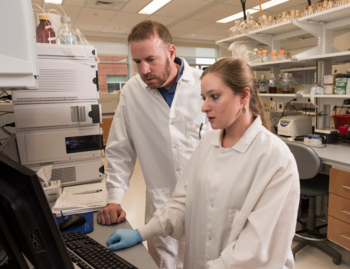According to the Centers for Disease Control and Prevention, more than 40% of Americans are classified as obese, leading obesity to be considered a significant public health threat. High fat diets, which are often cited as a cause of obesity, can also result in the development of metabolic syndrome, a group of conditions that may promote the progression of serious health conditions, including cardiovascular disease and type 2 diabetes. With obesity rates still rising, the hunt is on for ways to combat the negative effects of a high fat diet. George Mason University researchers now believe they have discovered a possible answer—probiotic supplementation.

Photo by Evan Cantwell/Creative Services
Robin Couch and Allyson Dailey, researchers in Mason’s College of Science and the Institute for Biohealth Innovation, are interested in the correlations between dietary intake and overall health. In a recent study, Couch and Dailey partnered with the U.S. Department of Agriculture to explore the influence of probiotic supplementation on a higher fat diet, using pigs as model organisms.
The research team looked at four groups of pigs—two groups that were fed nutritionally balanced diets with and without probiotic supplementation, and two groups that were fed higher fat diets with and without probiotic supplementation. The probiotic that was tested is known as Lacticaseibacillus paracasei. After six months of dietary intake, organ tissue samples obtained from the pigs were examined, specifically looking at their molecular composition.
Couch and Dailey were looking at specifically at metabolites, substances that are produced or used during metabolism. They found that the kidneys and the brain were particularly sensitive to a high-fat diet and when certain metabolites were noted to be at harmful levels, the kidneys and the brain were the most susceptible.
In contrast, they also discovered that, with probiotic supplementation, many of the detrimental metabolite levels reverted to levels found in pigs that were fed a healthy diet. In other words, probiotic supplementation staved off the negative effects associated with a high-fat diet, illustrating how probiotics may play a key role in preventative health care.
“We’d like to see probiotic intake become a regular part of the dietary recommendations that a physician would give to a patient,” said Dailey.
The researchers are also aiming to investigate other probiotic strains.
“If different strains do have distinct effects on the body, then you could see individualized probiotics, or even probiotic cocktails, being used to treat specific diseases,” said Couch. “We think it’s likely that, alongside pharmaceuticals, prescribing probiotics that address various diseases will be more commonplace in the future.”
Additionally, Couch and Dailey view this study as a stepping stone to potential subsequent work on how other nutrients, such as protein and carbohydrates, affect tissue composition.
“We specifically looked at the influence of a high-fat diet in our research, but this opens up a whole world of nutritional investigation at the metabolic level,” said Couch.
For now, the researchers are hoping that their study, which was recently published in the journal Metabolites, serves to add scientific validity to the claims of the benefits of probiotics.
“This is progress towards providing new evidence that probiotics are good for you and that what you consume has a profound effect on your health,” said Dailey. “These findings can contribute to the creation of revolutionary solutions, and, in the end, that’s why I’m in this—to help people thrive.”
More from IBI
- November 18, 2025
- July 25, 2024
- January 17, 2024
- August 30, 2023
- April 17, 2023
